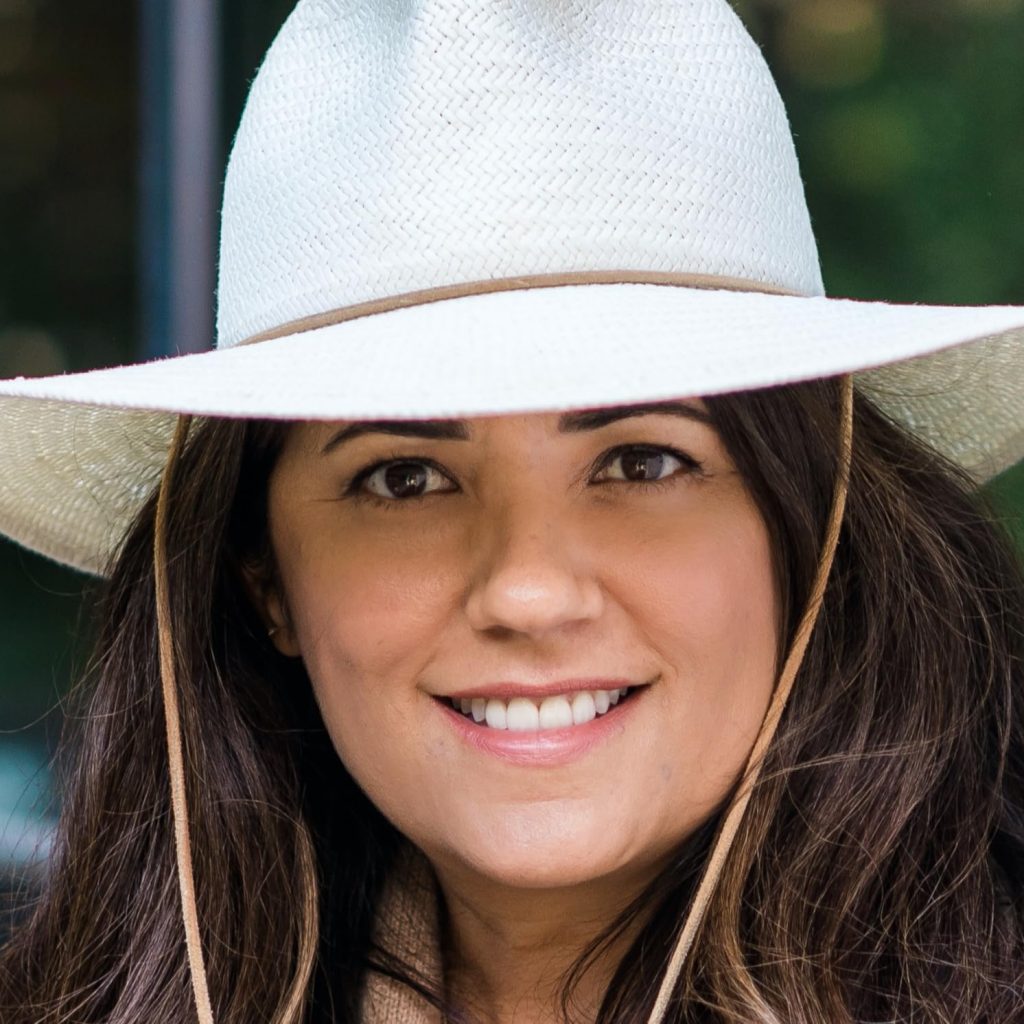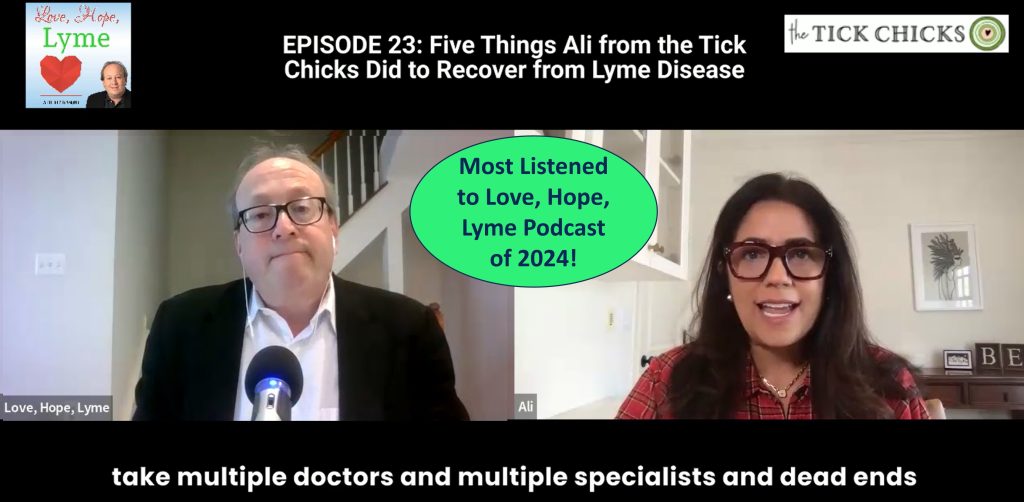PODCAST: The Tick Chick’s Top Recovery Tips for Lyme Survivors

By Fred Diamond
In the most downloaded episode of the Love, Hope, Lyme podcast in 2024, Ali from The Tick Chicks and host of the Lyme Time Podcast, shared her journey from a busy mother of three to a Lyme disease advocate who has inspired countless survivors navigating the labyrinth of diagnosis and treatment.
On this podcast, she delves into her top five tips for recovery—practical advice that’s rooted in her deeply personal journey and filled with hope for others walking the same path.
Antibiotic Trials: A Necessary Step
Ali’s first tip is straightforward: try antibiotics. “Whether you’ve been battling Lyme disease undiagnosed for a long time or you just saw the tick bite yesterday, antibiotics can help some people,” she shares.
Ali emphasizes the importance of starting antibiotics like doxycycline immediately after a tick bite, even while waiting for test results.
She recalls her own experience: “By the time I tried antibiotics, I was six years down the road. I wasn’t in the acute stage anymore, but I wasn’t quite through the second stage either.”
Despite the initial Herxheimer reaction—a detoxification process where symptoms worsen temporarily—Ali found value in this approach. “Even if you’ve been told you’re too far down the road, just try it. It could create a Herxheimer reaction for about 10 days, but that’s often a sign the antibiotic is working.”
Surrendering: Stop Chasing the Bug
For many, a diagnosis is both a relief and a new challenge. “When I was finally told, ‘You have Lyme disease,’ I was in disbelief,” Ali recalls. “I live in Los Angeles, I have good health insurance, and I’d been to all the top specialists. Yet it took six years to get tested.”
After the diagnosis, Ali learned to surrender to the reality that Lyme disease often doesn’t have a single “cure.” Instead of obsessing over bacterial loads or test results, she shifted her focus to managing symptoms.
“I told myself, ‘Let’s put that on the back burner. I’ll do my blood work once a year and focus on symptom control.’ This change took the obsession out of my journey and brought some peace to my healing process.”
Ali’s advice to survivors: Take a step back. Accept that healing from Lyme is a marathon, not a sprint. “When I surrendered, I began to see some real healing going on.”
Exploring Alternative Healing
Ali encourages survivors to explore alternative treatments alongside traditional medicine. “After surrendering, I decided to open my mind to anything that could help,” she says. Her approach was symptom specific. For example, she targeted nerve health when her nerve pain became unbearable.
She recommends starting with manageable steps:
- Gentle movement classes or swimming.
- Visiting a chiropractor for alignment and relief.
- Using supplements targeted to individual needs.
“I started with B vitamins because my nerves were fried. When pills didn’t work, I turned to vitamin IVs and shots,” she says. Ali also mentions the benefits of infrared saunas, NAD intravenous therapy, and herbal protocols.
“Herbs take time to work, but they’re an important part of the recovery journey.”
Ali’s openness to different approaches highlights an important aspect of healing: Every survivor’s journey is unique. “Lyme isn’t one-size-fits-all. You have to try what works for your body and your symptoms.”
Managing Intolerances and Environmental Triggers
One overlooked aspect of Lyme disease is the myriad intolerances it can trigger. From food to environmental factors, Lyme can make the body hypersensitive.
Ali shares her strategy: “I eliminated humidity and altitude, swapped out chemical-heavy cleaning products for organic options, and even changed my skincare routine. It’s about creating a safe environment for your body to heal.”
She also emphasizes the importance of clean eating. “Eat whole, simple foods. Stop piling on sauces and condiments. Clean eating helps reduce mast cell reactions and systemic inflammation.”
Brain Retraining: Healing the Mind
One of the most profound aspects of Ali’s recovery is brain retraining. “Lyme puts your body in constant fight-or-flight mode,” she explains. “Even when symptoms improve, your body can remain on edge.”
Ali turned to programs which focus on calming the nervous system and rewiring the brain’s responses. “Brain retraining allows you to tap into your vagus nerve and retrain your body to accept your surroundings again,” she says.
She pairs this practice with mindfulness techniques and gratitude. “One of my favorite mantras is, ‘I am safe.’ Remind yourself that you’re safe and that healing is possible.”
Ali also highlights the role of caretakers. “To all the caretakers out there, thank you. Thank you for supporting something you don’t understand. It means the world to Lyme survivors.”
A Message of Hope
Ali’s journey is a testament to resilience and the power of community. Through her platform, The Tick Chicks, she continues to offer resources, support, and encouragement to Lyme survivors. Her private Facebook group, filled with over a thousand members, provides a space for peer-to-peer connection.
“There is light at the end of the tunnel,” Ali says. “Keep your faith and keep fighting. Your life is beautiful, and you have so much to give to this world.”
Ali’s story reminds us that while Lyme disease may be an arduous journey, recovery is possible with the right tools, mindset, and support.
For those navigating their own paths, Ali’s words resonate deeply: “You will recover.”
Click here to listen to all episodes of the Love, Hope, Lyme Podcast or on YouTube.
Fred Diamond is based in Fairfax, Virginia and can be contacted via Facebook. His popular book, “Love, Hope, Lyme: What Family Members, Partners, and Friends Who Love a Chronic Lyme Survivor Need to Know” is available on Amazon. The e-version of the book is always free to Lyme survivors. PM Fred on Facebook or LinkedIn for your copy.





















We invite you to comment on our Facebook page.
Visit LymeDisease.org Facebook Page